Saturday, May 18, 2024. Annette’s News Roundup.
I think the Roundup makes people feel not so alone.
To read an article excerpted in this Roundup, click on its blue title. Each “blue” article is hyperlinked so you can read the whole article.
Please feel free to share.
Invite at least one other person to subscribe today! Here 👇 is the link to share for others to subscribe. https://buttondown.email/AnnettesNewsRoundup
Remember: when you share the Roundup, you are fighting Fascism and helping to bring about a Democratic victory in 2024.
_________________________________________________
About the 2024 Election for control of the Senate.
Polls.
Democrats Hold Leads in 4 Crucial Races That Could Decide Senate Control.
New battleground state polls by The New York Times, Siena College and The Philadelphia Inquirer show Democrats ahead in Arizona, Nevada, Pennsylvania and Wisconsin, and running well ahead of the president.
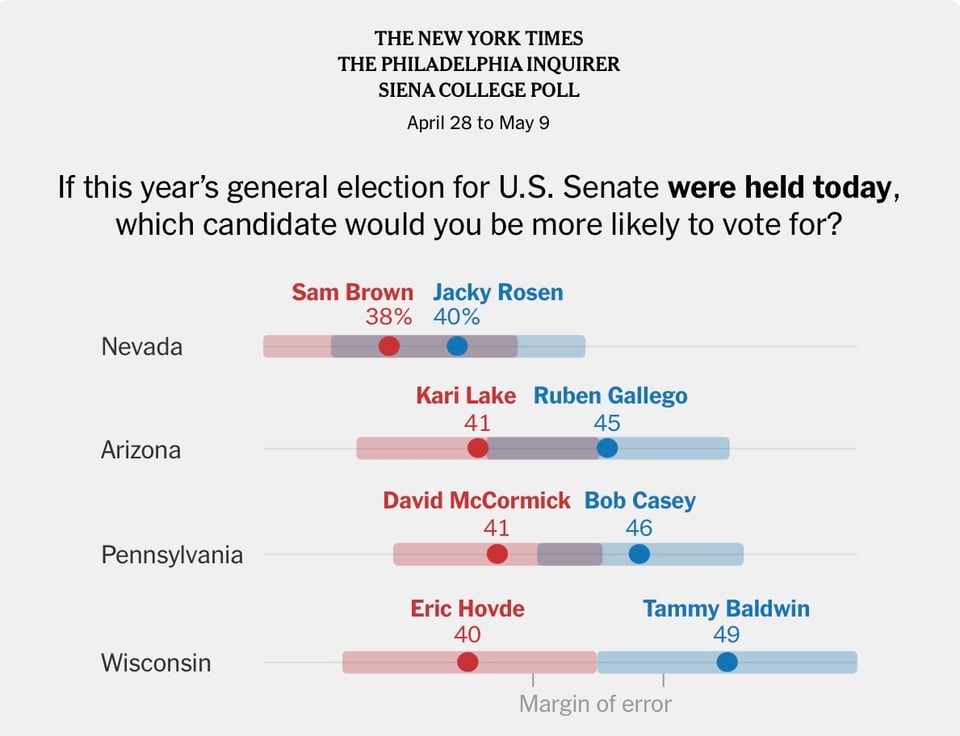
[Those] voters are enough to give Democrats a chance at holding the Senate, where they currently hold a one-seat majority. To maintain control, the Democrats would have to sweep every competitive Senate seat and win the White House. (The New York Times).
Note: these polls are based on registered, not likely, voters and it’s 171 days until Election Day 2024. 🤞
Arizona.
On A Roll - Gallego’s Strong Campaign Netting Dollars, GOP Support - Encouraging news From Politico today:
Democratic Rep. Ruben Gallego’s Arizona Senate bid is getting a boost from a group of donors who previously backed Republicans like the late Sen. John McCain and the independent incumbent he hopes to replace, Kyrsten Sinema.
The donors will host a fundraiser Saturday for Gallego, according to an invitation obtained by POLITICO. The eventsignals Gallego is making inroads in two areas GOP opponent Kari Lake is sharply focused on: money and moderates.
In their key Senate contest, Gallego and Lake are both openly courting a small but important bloc of voters who identify as independents or centrist Republicans.
Among the dozen hosts of Gallego’s Saturday fundraiser: Chuck Coughlin, a longtime Republican political consultant who left the party in the Trump era; Don Budinger, who donated to Sinema, McCain and Pennsylvania GOP Senate nominee Dave McCormick; and David Reese, a longtime GOP donor.
Both candidates have tried to drift toward the center. But Lake has thus far struggled to win over moderate voters despite an attempted pivot from her fiery 2022 campaign for governor…..
……Gallego has posted massive fundraising numbers, ending March with $9.6 million in the bank, compared to Lake’s $2.5 million. And he has used that funding to build an early TV ad advantage, running positive spots to define himself.
Democrats feel optimistic about Arizona because of Gallego’s financial advantage and Lake’s ties to the MAGA wing of the party that may harm her with independents. She’s endorsed by former President Donald Trump.
After telling McCain Republicans to “get the hell out” during her 2022 campaign, Lake has made an attempt to court them in her Senate run. But she has so far gotten few endorsements out of it and Republicans have begun to sound unsure whether they will fully support Lake financially in the fall. (Simon Rosenberg, Hopium Chronicles).
_________________________________________________
Where are we with Trump’s criminal trial in New York?
Donald Trump and Michael Cohen Deserve Each Other.
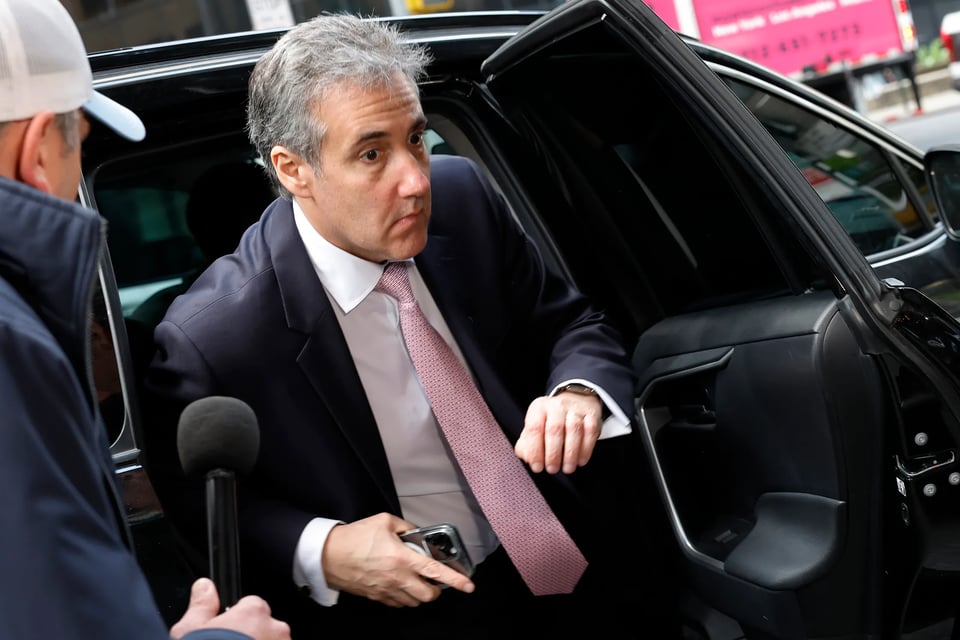
At the former President’s hush-money trial, Trump’s ex-lawyer is using his old boss’s playbook to help the prosecution.
On Tuesday afternoon, at the defense table on the fifteenth floor of the Manhattan Criminal Courthouse, Donald Trump was in his customary position: eyes closed, suit jacket splayed open, paunch sagging, arms crossed in a pose of utter boredom and contempt. Some said he was sleeping. I’d say more like anti-woke. Behind Trump, in the first row of the gallery, his son Eric was sitting upright, intently watching the witness on the stand: the former Trump lawyer and fixer Michael Cohen. Trumpworld—the swirl of relatives, hangers-on, opportunists, and would-be accomplices that surround the former President—has had many defectors over the years. But Cohen is the only one who spent a decade working for Trump and his kids. He admitted, on the stand, to having once thought of the Trumps as his “surrogate family.” Now that family was watching him air their dirty laundry. Eric Trump sat beside his wife, Lara Trump, the current co-chair of the Republican National Committee. At one point during Cohen’s testimony, Eric placed a hand in Lara’s lap. She placed her hands on top of his, as if to comfort him.
Cohen’s testimony is the crux of the Manhattan District Attorney’s case against Trump. This trial has also been Cohen’s Super Bowl. In 2018, Cohen pleaded guilty in federal court to illegally paying hush money to Stormy Daniels, an adult-film star, in the lead-up to the 2016 election, to keep her from going public with a story about having sex with Trump in 2006. Cohen spent thirteen months in prison, and, since his release, in 2020, he has been out to get revenge on his old boss. He has published tell-all books, hosted anti-Trump podcasts, and posted gleefully on social media about Trump getting indicted. “You know who I am, don’t you?” Todd Blanche, one of Trump’s attorneys, asked Cohen, at the start of his cross-examination. “I do,” Cohen replied. “As a matter of fact,” Blanche said, “on April 23rd—so after the trial started in this case—you went on TikTok and called me a ‘crying little shit,’ didn’t you?” Cohen didn’t flinch. “Sounds like something I would say,” he said.
On direct, Susan Hoffinger, an Assistant District Attorney, had asked Cohen about the scheme she and her fellow-prosecutors have sketched out in their case, in which Trump allegedly directed an illegal effort to bury negative stories about him before Election Day, 2016. Cohen did his best to confirm the story Hoffinger coaxed from him. When asked on whose behalf he’d paid a hundred and thirty thousand dollars to Daniels, he said, “On behalf of Mr. Trump.” And, if not for the Presidential campaign, would he have paid the money to Daniels? “No, Ma’am,” Cohen said.
Cohen was the prosecution’s final witness. The witnesses who preceded him had foreshadowed much of his testimony. Various former Trump aides said that Trump had signed checks that reimbursed Cohen for the payments to Daniels—and copies of those checks were shown to the jury. (One lesson future Presidents should take from Trump’s trial is not to sign their hush-money checks in Sharpie.) The jury has also seen handwritten notes jotted down by the Trump Organization’s C.F.O., Allen Weisselberg, detailing the hush-money reimbursement. (To settle the Daniels payment and some other outstanding business with Cohen, and to account for taxes, Weisselberg “grossed up” the reimbursement to three hundred and sixty thousand dollars, and then added a sixty-thousand-dollar “bonus.”) The D.A.’s office subpoenaed the publishing companies that have published Trump’s books, so that executives had to read out authenticated excerpts from Trump’s business-advice books, in which he has revelled in his reputation as a miser and boasted about reviewing each and every one of the checks he signs. (From “Think Like a Billionaire”: “When you are working with a decorator, make sure you ask to see all of the invoices.”) And yet, the only person able to tell the jury that Cohen committed his crimes at Trump’s behest was Cohen himself, who testified about a number of conversations in which he and Trump were allegedly the only participants. “You cannot make a serious decision about President Trump relying on the words of Michael Cohen,” Blanche told the jury during the defense’s opening statement. But the D.A. was asking them to do just that.
Going into Cohen’s cross-examination, the reporters who have been covering the trial mostly agreed that damaging Cohen’s credibility was the defense’s last and best chance at avoiding a conviction. The prosecution had been frank with the jury, not hiding the fact that Cohen is a confirmed perjurer, who carried himself like a gangster, and who was despised by almost everyone he dealt with. Could Blanche convince any member of the jury that Cohen wasn’t a scoundrel truthteller but merely a scoundrel? On Tuesday, Blanche mostly meandered. After his “crying little shit” opening gambit, he asked Cohen to confirm that he’d once referred to Trump as “dictator douchebag.” Did the jury get anything out of knowing the answer? (For most of the trial, the jurors have sat stone-faced.) Did Blanche’s client enjoy being there as he asked the question? (“It’s a disgrace what’s happening. This is something that shouldn’t be happening,” Trump told reporters in the hallway outside the courtroom.) “By the way,” Blanche asked, late in the day, “is it fair to say that you are motivated by fame?” “No, sir,” Cohen replied. “Is it fair to say you are motivated by publicity?” Blanche asked. “I don’t know if that is fair to say,” Cohen said. “I am motivated by many things.” Blanche did eventually get Cohen to acknowledge that he has lied to Congress, to Robert Mueller, and to the judge who sentenced him to three years in prison. Still, the legal analysts and professional Trump watchers in the gallery didn’t think much of Blanche’s work. “He needed to come out swinging, impose his will on Cohen, rattle him & make impression on jury,” Norm Eisen, a co-counsel for the House Judiciary Committee during Trump’s first impeachment, posted on X. “Not happening.” George Conway, the ex-husband of the former Trump campaign manager Kellyanne Conway, reposted Eisen and added his take: “Blanche just isn’t very good.” But Blanche has only been Trump’s lawyer for a year. Cohen has years of experience on him.
For how historically significant the Trump trial is, and how serious its consequences may be, the case is built around almost unbelievably childish behavior. On direct, Cohen testified that he and Trump spoke about the payment to Daniels numerous times, including during a phone call on October 24, 2016. Phone records show that at 8:02 p.m., Cohen called Keith Schiller, Trump’s bodyguard, and that the call lasted a minute and thirty-six seconds. Hoffinger had asked Cohen why he’d called Schiller that night. “Because I needed to speak to Mr. Trump . . . to discuss the Stormy Daniels matter and the resolution of it,” Cohen said. He said he often called Schiller if he needed to reach Trump. (Hope Hicks, Trump’s former communications aide, said Schiller often helped in “facilitating” phone calls for Trump.) On Thursday, Blanche asked Cohen about the October 24th call. “Do you remember at that time—October 22, 23, 24, 2016—you were receiving a bunch of ongoing and continuing harassment phone calls?” On screens, Blanche showed the jury text messages between Cohen and Schiller on the night of the 24th, in which Cohen asked Schiller how to report to the Secret Service the phone number of a teen-ager who’d been prank-calling him. A few minutes later, Schiller had texted back, asking Cohen to call him. “You had enough time in that one minute and thirty-six seconds to update Mr. Schiller about all the problems you were having with these harassing phone calls,” Blanche asked Cohen, “and also update President Trump on the status of the Stormy Daniels situation?”
Cohen said yes, he’d talked to both Schiller and Trump on the call. “I always ran everything by the boss immediately,” he replied. “And, in this case, it could have just been saying, ‘Everything is being taken care of, it’s going to get resolved.’ ” It was an awkward admission—Cohen had said nothing about having problems with a teen-ager, or talking to Schiller, earlier in the week. “That’s not what you testified to on Tuesday,” Blanche said, his voice rising. “That was a lie: you did not talk to President Trump on that night.” Blanche hit his high note. “You can admit it!” he screamed.
“No, sir,” Cohen said, coolly. “I can’t.”
On direct, Cohen had admitted to bullying and lying for a living when he worked for Trump—and to loving his job at the Trump Organization. “The only thing that was on my mind was to accomplish the task to make him happy,” he said. Witnesses usually dread cross-examinations, but in some ways Cohen seemed to be having a better time under hostile questioning from Blanche than he had while being led along by Hoffinger. Bullshitting, obfuscating, conflict—these are professional skills that Cohen still clearly enjoys indulging in. Blanche questioned him about a surreptitious tape he had made of Trump discussing a hush-money payment to Karen McDougal, a former Playboy Playmate who also said she had an affair with Trump. “You understand that it’s not ethical for a lawyer to record a conversation with their client, correct?” Blanche asked. “That’s correct,” Cohen said. Blanche continued that “unless there is a very specific circumstance, you’re not supposed to record your client, correct?” “You’re not, except, of course, [for the] crime-fraud exception, Rule 12,” Cohen said. Blanche sputtered. “I was just giving the example,” Cohen said, softly.
Of all the Trumpworld apostates, Cohen is the one who has remained most Trump-like. On the stand, he acknowledged that he saw many of his own qualities reflected in his former boss, and that he had adopted Trump’s playbook as his own: never back down, never admit error, never show embarrassment. A jury may well decide to take him at his word, but it is impossible to think that any one in the jury box completely believes him. The question is whether they’ll believe him more than they will Trump. The former President has expressed outrage that Cohen—a rat, a traitor, a “sleaze ball”—might do him in. Cohen has said that doing what he did for Trump ruined his life. In this way, they deserve each other. Nearly a decade ago, they cooked up a hush-money scheme so crooked that it’s still jamming up the gears of American politics. Seven years ago, one became President, and the other allowed himself to fantasize about becoming Attorney General, or maybe White House chief of staff. Now one is an ex-con, and the other may soon be branded a felon, and then, in a few months, maybe President-elect. ♦ (Erich Lach, The New Yorker).
On another matter. Remember this.
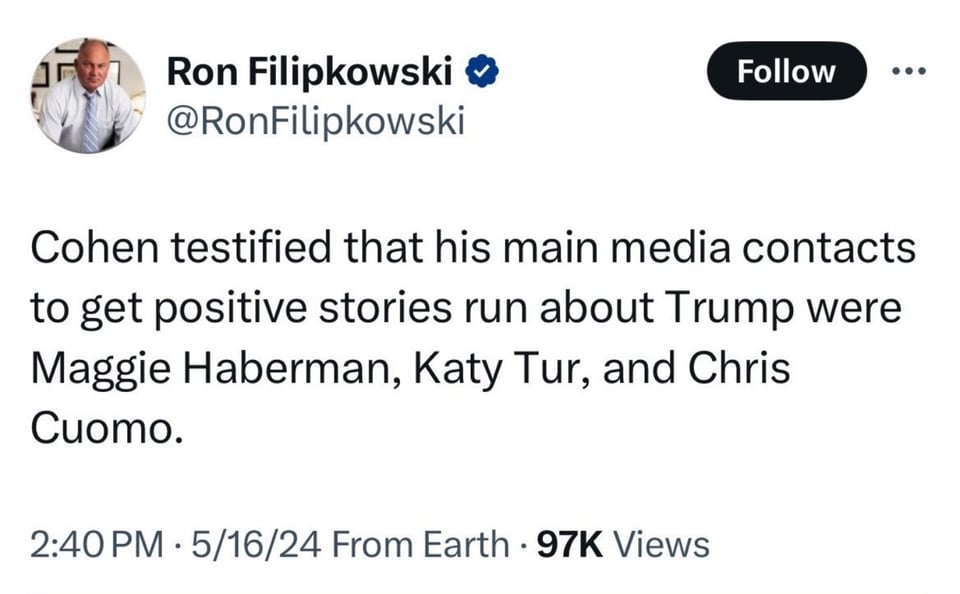
_________________________________________________
Remember this too. Donald Trump is responsible for the surge in political violence in America.
“Where’s Nancy.” “Hang Mike Pence.” Is the call to violence what Trump should best be known for? January 6 may have sealed that deal. And we should also recall Trump thought that the attack on Paul Pelosi was something to laugh about.
Here he was in September 2023.
“We’ll stand up to crazy Nancy Pelosi, who ruined San Francisco. How’s her husband doing, by the way, anybody know?” said Trump in remarks at a California GOP convention.
“And she’s against building a wall at our border even though she has a wall around her house, which obviously didn’t do a very good job.”
The crowd laughed.
Fortunately, a jury and a judge didn’t find this so funny.
Man sentenced to 30 years in prison for 2022 hammer attack on Nancy Pelosi's husband.
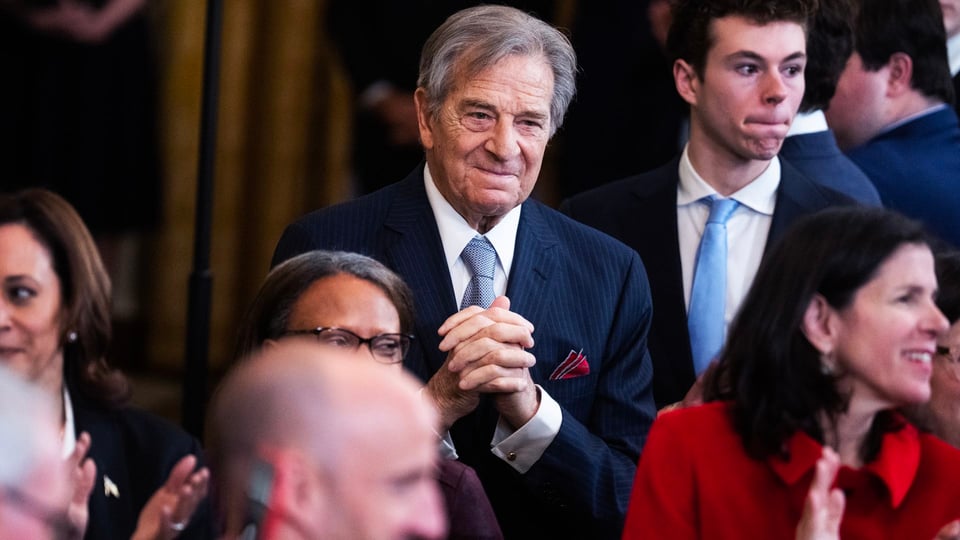
Paul Pelosi.
A federal judge sentenced the man convicted of assaulting and attempting to kidnap Paul Pelosi, the husband of Rep. Nancy Pelosi (D-Calif.), to 30 years in prison on Friday, AP reports.
Why it matters: David DePape's brutal attack on Paul Pelosi just before the 2022 midterm elections shook lawmakers from both parties and underscored the surging threats of violence they and other public officials face.
Paul Pelosi underwent surgery to repair a skull fracture and serious injuries to his right arm and hands after the attack.
DePape received the maximum sentence for each count, 20 years for one and 30 for the other, but both will be served concurrently and he will get credit for the 18 months he's already served.
What they're saying: "The Pelosi family couldn't be prouder of their Pop and his tremendous courage in saving his own life on the night of the attack and in testifying in this case," Aaron Bennett, a spokesperson for Nancy Pelosi, said in a statement after sentencing.
"Speaker Pelosi and her family are immensely grateful to all who have sent love and prayers over the last eighteen months, as Mr. Pelosi continues his recovery."
Context: Federal prosecutors sought a 40-year sentence for DePape — who assaulted Paul Pelosi with a hammer at the Pelosi residence in San Francisco — to discourage others from carrying out similar acts.
Nancy Pelosi in a letter to the judge before sentencing asked the court to give DePape a "very long" sentence.
Paul Pelosi revealed he has ongoing health problems stemming from the attack, CBS News reports.
Zoom in: After being arrested, DePape told police he intended to assault Rep. Nancy Pelosi, who was not home at the time of the attack, to "show other Members of Congress there were consequences to actions."
DePape had a history of making racist remarks and promoting baseless conspiracy theories online. He's a Canadian citizen who was in the U.S. illegallyat the time of the attack.
Just weeks before the attack, the FBI warned of a rise in politically driven violence in the country.
Zoom out: Threats against lawmakers and other officials have only increased after the attack on Paul Pelosi.
The Department of Justice warned earlier this week that threats against election workers are currently being "supercharged" by new technologies, including artificial intelligence.
The big picture: Surveys conducted in 2023 and earlier this year have shown that support for and the expectation of political violence has increased in the U.S. (Axios).
_________________________________________________
This news broke on Friday night.
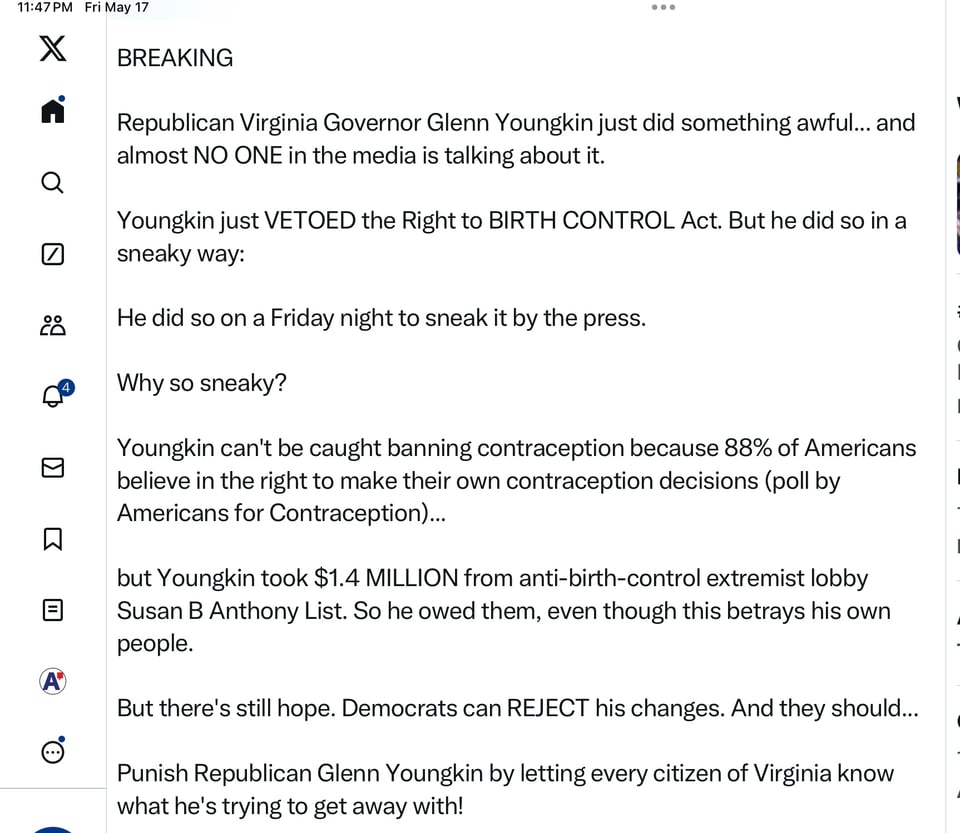
Spread the word.
Worry less. Do more.
_________________________________________________
Demand something be done about this too.
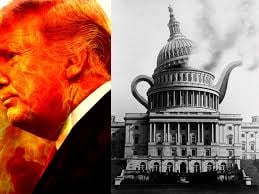
Historian Heather Cox Richardson wrote this:
“In the 1920s, President Warren G. Harding’s secretary of the interior, Albert Fall, went to prison for a year for accepting a $385,000 bribe from oilman Edward L. Doheny in exchange for leases to drill for oil on naval reserve land in Elk Hills and Buena Vista, California, and Teapot Dome, Wyoming. Fall was the first former cabinet officer to go to prison, and the scandal was considered so outrageous that “Teapot Dome” has gone down in U.S. history as shorthand for a corrupt presidency.”
She wrote about the Teapot Dome scandal in the wake of the May 9th Washington Post report that former President Trump held a 20-person “Energy Round Table” with top oil and gas executives at his Mar-a-Lago Club on April 11, 2024.
The article from the Washington Post was in the May 15th issue of the Roundup.
As you may recall, according to the reporting, the former President sought $1 billion in campaign contributions from the industry executives in exchange for an explicit promise that, if elected, his Administration would roll-back environmental regulations. Former President Trump reportedly pledged to take specific official actions to end the freeze on permits for new liquefied natural gasexports, start auctioning off more leases for oil drilling in the Gulf of Mexico, and rescind rules that reduce emissions from cars.
According to the Washington Post, Trump told industry executives, “You all are wealthy enough” and that “you should raise $1 billion to return me to the White House.”
These are the facts. Now we must ask what can be done about Trump’s promise of a quid pro quo, money for oil leases.
Section 201 of Title 18 of the Federal Law is entitled "Bribery of public officials and witnesses."
But Trump is not presently a public official, so what can be done?
Write to your elected officials and ask. Write to Attorney General Merrick Garland and ask. Demand an investigation be opened into the promise by a corrupt candidate of a quid pro quo, money for oil leases.
Worry less. Do more.
_________________________________________________
Have a good weekend. See you on Tuesday.
_________________________________________________